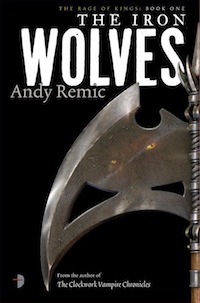At first I thought it was me. I couldn’t understand the sensations I experienced as I read through Andy Remic’s new novel, The Iron Wolves, the first book of his Rage of Kings series. It took me quite a long time—it was somewhere around the third gushing artery or fourth shattered nose—to realize that I was reading a book written in a foreign language.
Story-wise the novel is reasonably apprehensible. Years before the events depicted herein there was a Battle-of-Thermopylae-esque showdown at the Pass of Splintered Bones (and if you’re going to have a grisly, violent showdown, that sounds like the right place to do it), between the forces of evil, represented by the wizard Morkagoth and his mud-orcs, and the forces of not-evil, represented by the military company known as the Iron Wolves.
In the end, the Iron Wolves emerged as victors and legendary heroes. The political and historical landscapes of this fantasy world are unaddressed in the narrative, but I am going to assume Wolves’ victory is supposed to be understood as having been a good thing. Though I tend to be of the opinion you must ask what political grievances the orcs had that were not solvable through diplomacy.
As this tale begins, a sorceress named Orlana the Horse Lady stalks the land, using her magic to create a vast army of twisted animal men, mostly by merging horses with their riders and creating weird body-horror centaurs, but on occasion also turning men into weird slavering Ron Perlmans. Orlana marches her army on Vagandrak, where King Yoon is busy doing all the debauched behaviors you typically do when you’re a mad king.
Old General Dalgoran goes about putting the band back together, seeking out the Iron Wolves for one last hurrah. There’s a bit of Magnificent Seven or Dirty Dozen thrown in—though maybe the most apt comparison is the menagerie of meatballs grimacingly assembled in The Expendables—as the Wolves turn out to be a ragtag band of dissipated misfits, drug addicts, pimps, and gamblers, all difficult to rouse. But somehow they pull it together and ride out together once more. As the Iron Wolves return once more to the Pass of Splintered Bones, they find themselves outnumbered approximately 100,000 to 1, under the rule of a blundering Hannibal Lecter as played by Robin Williams, and fighting against an army of what are basically just scary horses.
The Iron Wolves is pulp fantasy. And I like pulp fantasy, but this is extra pulp. This is a bucket of hot, wet, bloody pulp. It is grimdark to the max. That the word “grimdark” is not infrequently used to describe Remic’s prose, but describes also a particularly violent genre of fanfiction is perhaps not coincidental. There are some ineffable qualities of “bookness” that you expect the stories you read to possess, and when a book lacks these one can only be puzzled at the fact that the thing in your hands is, in fact, a book. You can see it is with your eyes.
I’m not sure I can say whether I liked or disliked this book. And by that I don’t mean I’m conflicted or indecisive on the subject, I mean it’s maybe not an answerable question. There are books that you think are bad books, and there are books that may or not be bad books but are simply for an audience different from yourself, and then there are books so alienated from your experience and expectation as a reader that it’s difficult to even imagine how they can be approached. This book is like that. This book does not speak my language.
Like the vast phalanges of book reviewers who for hours sullenly stared at a blank page trying to imagine something meaningful they could say about Fifty Shades of Grey after it became a blockbuster hit too big to ignore, I find myself in the position of having to review an almost foreign work without a translator. As with Fifty Shades, the reviewer is rendered almost irrelevant in the equation, the discernment (one hopes) one has developed and honed to a keen edge is like a scalpel brought to a gun fight.
This is not so much to mourn once more, tediously, the death of the book, nor to eulogize its gatekeepers. There is and always has been a place for folk art, which, in effect, is what this is. That place is probably not in the canon, unfortunately, but who reads the canon anymore really. I do look forward to the day when the bestseller lists are mostly dominated by Supernatural slashfic and a random assortment of creepypasta, though I will understand most of those about as much as I truly understood The Iron Wolves. I think every reader needs occasional encouragement to get down off their high horse.
The Iron Wolves is available now from Angry Robot.
David Moran lives in San Francisco with two cats and his roommate, The Lesser Key of Solomon. Sometimes he tweets.










